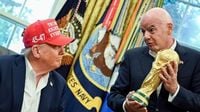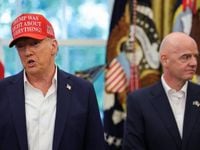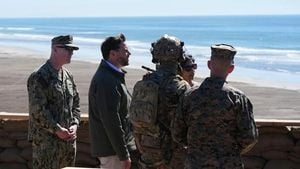The countdown to the 2026 FIFA World Cup has been anything but quiet, as political tensions and logistical debates swirl just eight months before the world’s biggest soccer tournament kicks off across North America. The United States, along with cohosts Mexico and Canada, is gearing up to welcome millions of fans, but recent comments from U.S. President Donald Trump have thrown a spotlight on the delicate balance between politics and the beautiful game.
President Trump, never one to shy away from a headline, ignited controversy in late September 2025 when he publicly threatened to relocate World Cup matches from U.S. cities he deemed unsafe. His comments, initially aimed at Illinois, quickly zeroed in on Boston and its suburb Foxborough, home to Gillette Stadium, which is slated to host seven World Cup matches—including a coveted quarterfinal on July 9, 2026. "If I think it's not safe, we're going to move it out of that city," Trump declared, adding, "Any city we think is going to be even a little bit dangerous for the World Cup, or for the Olympics [in Los Angeles in 2028]... they play in so many cities, we won't allow it, we'll move it around a little bit. But I hope that's not going to happen."
Trump doubled down in mid-October, specifically targeting Boston’s Mayor Michelle Wu, whom he called "intelligent but radical left." Speaking to reporters, he asserted, "We could take them away. I love the people of Boston, I know the games are sold out, but your mayor is not good." He continued, "If somebody is doing a bad job, and if I feel there’s unsafe conditions, I would call Gianni – the head of FIFA who’s phenomenal – and I would say, 'Let’s move into another location,' and they would do that. He wouldn’t love to do it, but he’d do it very easily."
But can the President of the United States really pull the strings of the world’s largest sporting event? According to FIFA, it’s not that simple. FIFA vice president Victor Montagliani, also president of CONCACAF, responded swiftly at a sports business conference in London, saying, "It’s FIFA’s tournament, FIFA’s jurisdiction, FIFA makes those decisions." Montagliani emphasized that the World Cup is governed by strict contracts and hosting agreements, and that the U.S. government cannot unilaterally dictate where matches are played. "With all due respect to current world leaders, football is bigger than them and football will survive their regime and their government and their slogans," he said. "That’s the beauty of our game, is that it is bigger than any individual and bigger than any country."
Yet, just as the dust seemed to settle, FIFA’s official stance appeared to soften. In a statement released through Sky Sports, FIFA highlighted that "Safety and security are the top priorities at all FIFA events worldwide. Safety and security are obviously the governments' responsibility, and they decide what is in the best interest for public safety. We hope every one of our 16 host cities will be ready to successfully host and fulfill all necessary requirements." The message, while vague, left the door open to the possibility of changes if local conditions warranted—and if the U.S. government pushed hard enough.
Boston Mayor Michelle Wu, however, was quick to call the President’s bluff. Speaking on a local podcast, she dismissed the notion that a single person, even the President, could unilaterally remove World Cup matches from a city so close to the tournament. "There’s no ability to take away the World Cup games," Wu stated. "There’s no real threat when it comes to saying cities are so unsafe that they can’t host the games." She pointed out that most details are "locked down by contract," making changes at this stage nearly impossible.
Foxborough’s Gillette Stadium, just 48 kilometers (30 miles) from Boston, is set to host five group stage games, one round of 32 match, and a high-profile quarterfinal. The announcement of so many marquee matches took local organizers by surprise. "The later in the tournament, the more eyeballs," said Mike Loynd, head of Boston’s World Cup organizing committee. "For us, it’s just a matter of excitement. … For us, it’s a perfect schedule. I don’t think FIFA could have done a better job."
The stakes are enormous for the region. Organizers estimate that the tournament will inject $1.1 billion into the local economy, create over 5,000 jobs, and generate more than $60 million in tax revenue. More than two million visitors are expected to descend on New England during the World Cup’s 39-day run, bringing a carnival atmosphere and global attention to the area.
Gillette Stadium itself is operated by Robert Kraft, owner of the NFL’s New England Patriots and Major League Soccer’s New England Revolution. Kraft, who served as honorary chair of the United Bid Committee that brought the World Cup back to the U.S., has a long-standing social relationship with Trump dating back to the 1990s. Kraft even gifted Trump a diamond-encrusted Super Bowl ring during his first term, a gesture confirmed by the team at the time. However, Kraft has said he hasn’t spoken to Trump since January 6, 2021.
The political undertones run deep. Trump’s administration has targeted Boston throughout 2025, suing the city over its sanctuary policies and deploying National Guard troops in other U.S. cities. Mayor Wu, who is running unopposed for re-election, has repeatedly touted Boston’s historically low crime rates and record declines in gun violence. In 2024, the city recorded just 24 homicides—the lowest number on record. While 2025 has seen a slight uptick to 27, Wu insists that Boston remains one of the safest major cities in the country.
So, what does history tell us about the prospect of moving World Cup matches? FIFA has occasionally shifted venues in the past, but only for extraordinary reasons. In 1962, the Valdivia earthquake forced Chile to overhaul its World Cup plans, while in 1966, a group match was relocated due to a scheduling conflict at Wembley Stadium. In 1990, England requested to play on the island of Sardinia to avoid hooliganism on the mainland. These rare cases underscore the logistical and legal challenges of making such changes, especially with binding contracts already in place for the 2026 tournament.
The official list of 2026 U.S. host cities reads like a who’s who of American sports: MetLife Stadium (East Rutherford, NJ), AT&T Stadium (Arlington, TX), NRG Stadium (Houston, TX), Mercedes-Benz Stadium (Atlanta, GA), SoFi Stadium (Inglewood, CA), Lumen Field (Seattle, WA), Levi’s Stadium (Santa Clara, CA), Lincoln Financial Field (Philadelphia, PA), Hard Rock Stadium (Miami, FL), and Gillette Stadium (Foxborough, MA). Each venue has invested heavily in preparations, with local governments and organizers banking on the economic and cultural windfall.
As the debate rages on, one thing is clear: the intersection of sports and politics is as lively as ever. While President Trump’s rhetoric has stirred the pot, the ultimate authority rests with FIFA and the complex web of contracts that underpin the tournament. With kickoff looming, all eyes remain fixed on whether political pressure or logistical realities will shape the final roster of World Cup host cities.
For now, Boston and Foxborough are forging ahead with their plans, determined to showcase their city—and their stadium—to the world. The 2026 FIFA World Cup promises to be a spectacle, with or without the political fireworks. Stay tuned, because in the world of global sports, anything can happen.





